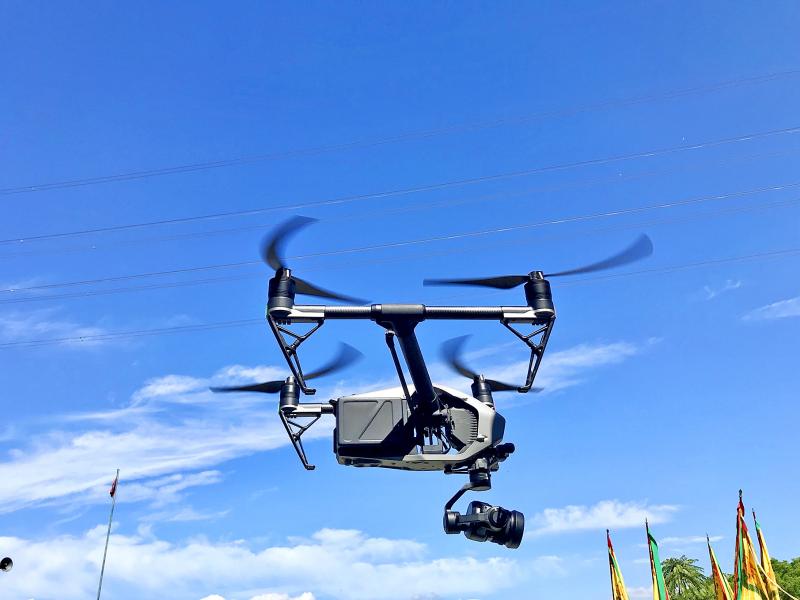China-made commercial drones might contain back doors and malware that transmit flight and video data to the government in China, an official said yesterday.
Speaking on condition of anonymity, the senior official said that Chinese drones, widely used by farmers for crop dusting, pose a significant cybersecurity threat to users and the government.
Beijing has unrestricted access to private user data held by Chinese corporations, which are obligated to cooperate with the country’s national intelligence efforts under China’s National Intelligence Law, the official said.

Photo courtesy of a reader
In Taipei, government agencies have taken steps to remove Chinese-manufactured devices and software from official use as President Tsai Ing-wen (蔡英文) has made cybersecurity a priority in her national security policy, the source said.
Security protocols were tightened to no longer allow middle and high-ranking officials to use Chinese-made electronics for work or personal use, they said.
The official spoke on the matter following a statement by the National Communications Commission (NCC) on Thursday that said Xiaomi Corp’s (小米) Mi 10T 5G smartphones have built-in censorship capabilities and can transmit user data to servers in Beijing.
The commission said that its Telecommunications Technology Center in October last year tested a model sold in Taiwan, after the Lithuanian National Cyber Security Center on Sep. 21 last year discovered the device’s censorship capabilities.
The official yesterday said that while Xiaomi disavowed security issues with its products by saying that the features did not appear in models sold in Taiwan and Europe, the claims were not supported by the NCC’s independent analysis, and its report raised troubling implications about Chinese electronics.
The ban on devices applies to government employees only and not private citizens, the source said, adding that the government could only advise the public against buying products with compromised security features.

Taiwan has received more than US$70 million in royalties as of the end of last year from developing the F-16V jet as countries worldwide purchase or upgrade to this popular model, government and military officials said on Saturday. Taiwan funded the development of the F-16V jet and ended up the sole investor as other countries withdrew from the program. Now the F-16V is increasingly popular and countries must pay Taiwan a percentage in royalties when they purchase new F-16V aircraft or upgrade older F-16 models. The next five years are expected to be the peak for these royalties, with Taiwan potentially earning

STAY IN YOUR LANE: As the US and Israel attack Iran, the ministry has warned China not to overstep by including Taiwanese citizens in its evacuation orders The Ministry of Foreign Affairs (MOFA) yesterday rebuked a statement by China’s embassy in Israel that it would evacuate Taiwanese holders of Chinese travel documents from Israel amid the latter’s escalating conflict with Iran. Tensions have risen across the Middle East in the wake of US and Israeli airstrikes on Iran beginning Saturday. China subsequently issued an evacuation notice for its citizens. In a news release, the Chinese embassy in Israel said holders of “Taiwan compatriot permits (台胞證)” issued to Taiwanese nationals by Chinese authorities for travel to China — could register for evacuation to Egypt. In Taipei, the ministry yesterday said Taiwan

Taiwan is awaiting official notification from the US regarding the status of the Agreement on Reciprocal Trade (ART) after the US Supreme Court ruled US President Donald Trump's global tariffs unconstitutional. Speaking to reporters before a legislative hearing today, Premier Cho Jung-tai (卓榮泰) said that Taiwan's negotiation team remains focused on ensuring that the bilateral trade deal remains intact despite the legal challenge to Trump's tariff policy. "The US has pledged to notify its trade partners once the subsequent administrative and legal processes are finalized, and that certainly includes Taiwan," Cho said when asked about opposition parties’ doubts that the ART was

If China chose to invade Taiwan tomorrow, it would only have to sever three undersea fiber-optic cable clusters to cause a data blackout, Jason Hsu (許毓仁), a senior fellow at the Hudson Institute and former Chinese Nationalist Party (KMT) legislator, told a US security panel yesterday. In a Taiwan contingency, cable disruption would be one of the earliest preinvasion actions and the signal that escalation had begun, he said, adding that Taiwan’s current cable repair capabilities are insufficient. The US-China Economic and Security Review Commission (USCC) yesterday held a hearing on US-China Competition Under the Sea, with Hsu speaking on